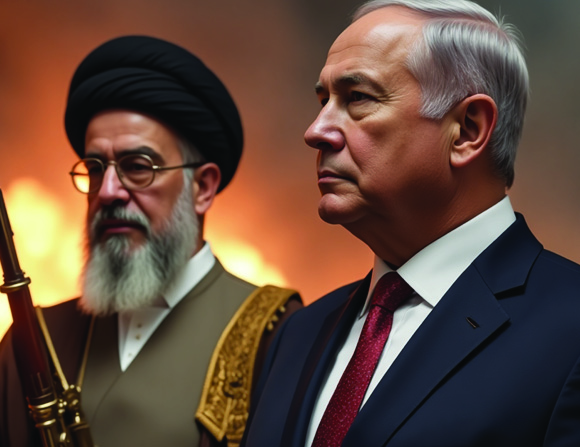
World War 3 may be looming on the horizon
Tarek Ramadan
6-25-2025
 Email
to a friend Email
to a friend
 Post
a comment Post
a comment
 Print Print
When we look closer, the story doesn’t add up. Iran has insisted its nuclear facilities are for civilian purposes only, and for years, the U.S. preferred negotiation over confrontation. Meanwhile, Israel, a nuclear-armed state with hundreds of warheads, has been pushing aggressively toward war, despite already being stretched thin by conflicts with Gaza, Lebanon and Syria.
Beyond the surface, this war feels less about nuclear fears and more about a struggle for control over the Middle East’s future.
Why does Israel with it's hundreds of nuclear warheads, treat Iran’s civilian program as an existential threat?
Moreover, the geographic and military realities challenge the logic of this conflict. Iran sits nearly two thousand kilometers away from Israel, and with sophisticated defense systems and regional allies, it can intercept Israeli attacks long before they reach Iranian soil. Yet, Israeli strikes have penetrated deep into Iranian territory multiple times without serious Iranian military retaliation.
Israel hasn’t just stopped at threats. Over the years, it has actively worked to weaken Iran’s influence in the region. From destabilizing Syria, where Iran has a strong foothold, to targeting and eliminating leaders of Hezbollah—one of Iran’s key allies—Israel has effectively clipped Iran’s wings in the Middle East. Even more striking was the recent Israeli attack inside Iran that killed a top Iranian officials including Hamas negotiator linked to Tehran.
Yet, Iran’s response has been relatively soft—mostly symbolic strikes rather than decisive military action. This imbalance raises the question: if Iran truly wanted to defend its sovereignty and regional power, why hasn’t it launched a serious, large-scale attack against Israel? Or is it more about a calculated geopolitical chess game.
This is about much more than nuclear facilities; it’s about who gets to decide the future of a region rich in resources, culture, and strategic importance.
The United States, burdened by staggering national debt and economic challenges, is increasingly squeezed by the rapid ascent of China as a global economic powerhouse. Meanwhile, Russia’s direct threat to the US in case it decides to attack Iran and its aggressive moves in Ukraine as well as the persistent tensions with North Korea add layers of unpredictability to international stability. In this volatile mix, some voices suggest that stirring conflict—whether directly or through proxies like Israel and Iran—could serve as a way to distract populations, reset economic dynamics, and reassert global dominance.
Alongside economic pressures, the United States under Trump has pushed aggressively for financial gains—from demanding payments from Middle Eastern countries like Saudi Arabia and Qatar to bold territorial ambitions, such as eyeing Greenland and even proposing a merger with Canada and the golf of Mexico When these strategies faltered, the focus shifted dramatically toward militarization at home. Suddenly, military parades filled American streets—a striking image from a leader who never previously launched a war.
American media, far from questioning this shift, have embraced and amplified it, praising America’s military heritage and framing the country as fundamentally a military power. This cultural buildup primes the public to accept, even expect, larger conflicts ahead. Taken together, these moves suggest a troubling drive toward escalating global tensions—a desperate, irrational attempt to secure economic and geopolitical dominance, no matter the cost.
It’s important to remember that Israel acts as America’s extended arm in the Middle East. It simply doesn’t make sense for the U.S. to leave Israel alone in a devastating war against a powerful nation like Iran—one capable of striking anywhere within Israeli territory. The reality is that these moves are part of a calculated plan.
This means the U.S. isn’t caught off guard; it knows the war’s trajectory and is prepared to escalate when convenient. It’s a chilling reminder that this conflict is less about defending against an immediate threat and more about orchestrated power plays with global implications.
In the end, this war isn’t truly about nuclear programs or immediate security threats. It’s about competing visions of power specially since Iran joined the BRICS and don't trade with US dollars, its clearly an economic desperation, and geopolitical strategies that ignore the human cost. The real tragedy is that ordinary people—on all sides—are caught in a conflict driven by irrational ambitions that threaten to plunge the region, and possibly the world, into deeper chaos.
All of this paints a grim picture—that World War 3 may be looming on the horizon, driven by irresponsible leadership and a world losing sight of reason and humanity.
|